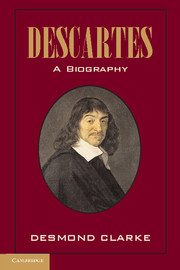Book contents
- Frontmatter
- Contents
- Preface and Acknowledgments
- Note on Texts and References
- Descartes Family Tree
- Introduction
- 1 A Lawyer's Education
- 2 In Search of a Career (1616–1622)
- 3 Magic, Mathematics, and Mechanics: Paris, 1622–1628
- 4 A Fabulous World (1629–1633)
- 5 The Scientific Essays and the Discourse on Method (1633–1637)
- 6 Retreat and Defence (1637–1639)
- 7 Metaphysics in a Hornet's Nest (1639–1642)
- 8 The French Liar's Monkey and the Utrecht Crisis
- 9 Descartes and Princess Elizabeth
- 10 The Principles of Philosophy (1644)
- 11 The Quarrel and Final Rift with Regius
- 12 Once More into Battle: The Leiden Theologians (1647)
- 13 Thoughts of Retirement
- 14 Death in Sweden
- Appendix 1 Descartes' Principal Works
- Appendix 2 Places Where Descartes Lived
- Notes
- Bibliography
- Index
3 - Magic, Mathematics, and Mechanics: Paris, 1622–1628
Published online by Cambridge University Press: 18 July 2009
- Frontmatter
- Contents
- Preface and Acknowledgments
- Note on Texts and References
- Descartes Family Tree
- Introduction
- 1 A Lawyer's Education
- 2 In Search of a Career (1616–1622)
- 3 Magic, Mathematics, and Mechanics: Paris, 1622–1628
- 4 A Fabulous World (1629–1633)
- 5 The Scientific Essays and the Discourse on Method (1633–1637)
- 6 Retreat and Defence (1637–1639)
- 7 Metaphysics in a Hornet's Nest (1639–1642)
- 8 The French Liar's Monkey and the Utrecht Crisis
- 9 Descartes and Princess Elizabeth
- 10 The Principles of Philosophy (1644)
- 11 The Quarrel and Final Rift with Regius
- 12 Once More into Battle: The Leiden Theologians (1647)
- 13 Thoughts of Retirement
- 14 Death in Sweden
- Appendix 1 Descartes' Principal Works
- Appendix 2 Places Where Descartes Lived
- Notes
- Bibliography
- Index
Summary
The entire method consists in the order and arrangement of the things to which the mind's eye must turn so that we can discover some truth.
(Rules: x. 379)During the years immediately prior to his second departure for the United Provinces, Descartes struggled unsuccessfully with a number of fundamental problems in mathematics and philosophy. The results of those efforts are recorded in the Rules for Guiding the Mind in Searching for the Truth, which was published posthumously, and in comments made in the biographical paragraphs of the Discourse on Method. The intellectual milieu in which Descartes lived was as fluid as the uncertainty of the initial steps on his intellectual journey suggests. His foreign travels confirmed at least the narrowness of the education he had received from the Jesuits. They also exposed him to a wide range of disparate views – religious, magical, and mystical – that were defended by apparently genuine believers. Descartes seems never to have been enamoured sufficiently of anyone's thought to consider seriously adopting it. This same general scepticism applied more vigorously in the case of authors such as Campanella and Bruno. His glancing encounter with their work, however, provided the conditions in which Descartes briefly considered and definitively rejected all forms of magic and mysticism in favour of an ideal of mechanical explanation.
- Type
- Chapter
- Information
- Descartes: A Biography , pp. 67 - 96Publisher: Cambridge University PressPrint publication year: 2006

